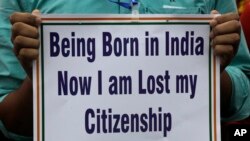U.N. agencies are urging Indian authorities to ensure that more than four million people threatened with statelessness retain their basic rights and access to services while their claims of citizenship are under review.
The U.N. refugee agency says it is too soon to know the implications of India’s recent decision to strip more than four million people of their citizenship. People threatened with statelessness are those or descendants of those who have arrived in Assam State after March 1971 when Bangladesh became independent.
The prospect of what lies ahead is very worrisome for an organization that is campaigning to end statelessness globally for some 10 million people by 2024. UNHCR spokesman William Spindler told VOA the nationality status of those excluded is not yet clear.
“Many may ultimately be declared Indian citizens at the end of this process. At the same time, others may be at risk of statelessness... The process is still under way and we are appealing to the Indian authorities to ensure that even those who do not qualify for citizenship are not subject to deportation,” he said.
Spokeswoman for the High Commissioner for Human Rights Ravina Shamdasani agrees with the UNHCR it is premature to talk about statelessness. But, she told VOA it is critical for the Indian government to ensure that whatever processes it carries out are done in a transparent and non-discriminatory manner.
“There must not be any disenfranchisement. They should ensure that people have access to their basic services; that they are adequately informed about the policies, the situations and, if necessary, they have avenues for legal redress," said Shamdasani.
The U.N. agencies say they will be closely monitoring the situation. They are urging the Indian authorities to provide these millions of people living in limbo with all the opportunities and help they need to file their claims for citizenship.




